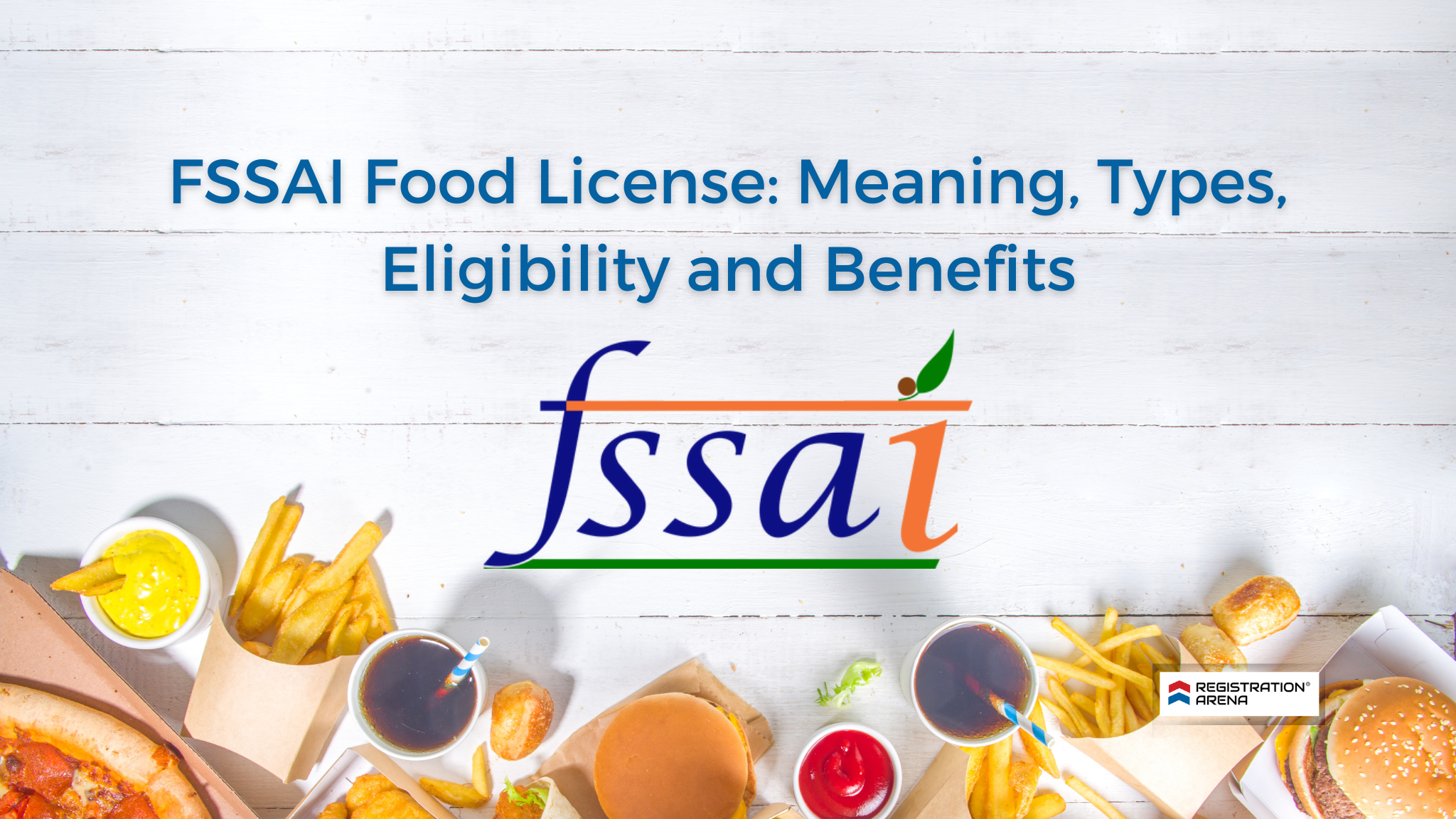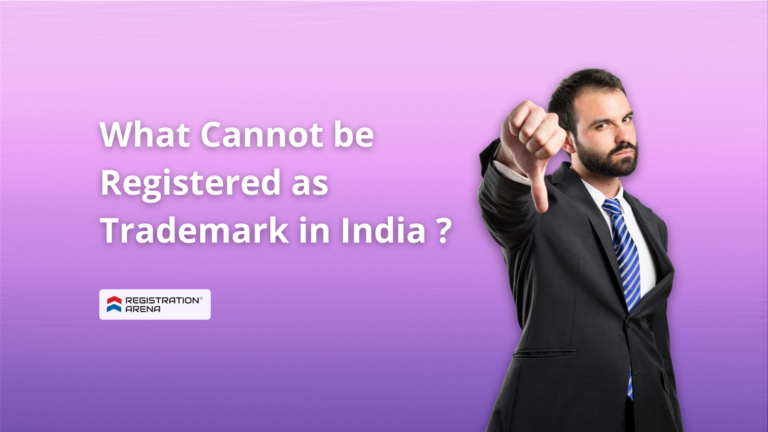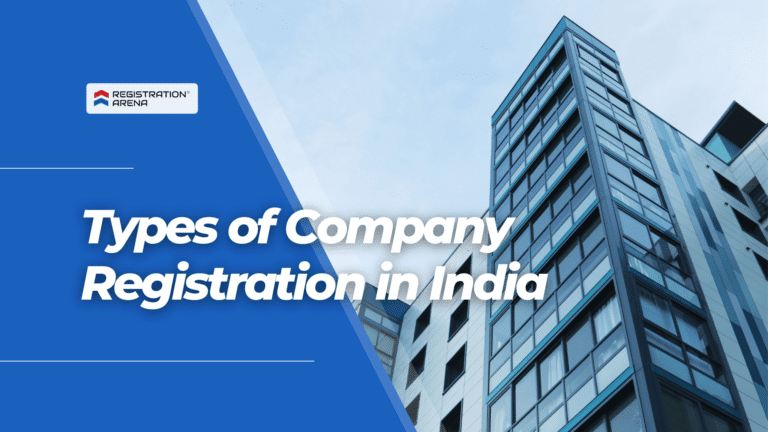The food and beverage industry is evolving rapidly and is considered one of the most welcoming industries in India. This developing sector requires businesses to adopt standard practices to ensure the safety and welfare of consumers. Businesses can achieve this by obtaining a license from the appropriate authority. The Food Safety and Standards Authority of India (FSSAI) is the authority that grants licenses for the maintenance of food safety standards in India. In this article, we will guide you about the meaning, different types, and benefits of the FSSAI food license. In addition, we will discuss the eligibility for an FSSAI license or registration in detail.
Meaning of FSSAI and FSSAI License
FSSAI i.e., the Food Safety and Standards Authority of India is an independent governmental organization. It is established under the Food Safety and Standards Act, 2006 to regulate and supervise the safety and standards of food products in India. In addition, it functions under the administrative control of the Ministry of Health & Family Welfare, Government of India.
In simple words, FSSAI registers and issues license to FBOs i.e., Food Business Operators like food manufacturing and processing units, hotels, restaurants, dairy units, etc.
Applicable Law
Governed under Section 31 of the Food Safety and Standards Act, 2006, every food business shall obtain a license for the commencement/ carrying of a business. However, petty manufacturers are required to take registration instead of a license.
Further, the Food Safety & Standards (Licensing and Registration of Food Business) Regulations, 2011 provides the procedure for obtaining a license and registration.
Which FBOs Require FSSAI License/ Registration?
All Food Business Operators including those below shall apply for an FSSAI license or registration –
- Small or petty retailers like bakery shops, snacks shops, etc.
- Temporary or fixed stalls selling food products like tea, juice, samosa, vada-pav, gol gappa, chaat, etc.
- Hawkers selling food products (freshly prepared or packaged) by moving from one place to another
- Vegetable Oil Processing Units, Fish and Meat Processing Units
- Dairy units including milk vendors and petty milkmen
- Slaughtering houses like mutton shops, chicken shops, etc.
- Storage units or warehouses like cold storage
- Other food manufacturing or proceedings units
- Hotels, restaurants, bars, clubs, etc.
- Banquet halls, dhabas, dabba wallas, home-based canteens, etc.
- Novel food and proprietary food
- Food product transporters such as milk tanks, food trucks, etc.
- Food products distributor (wholesaler, suppliers) and marketer
- Cafeteria and Canteens (including mid-day meal canteens)
- Caterers and food vending agencies
- Pharmacies or medical stores selling health supplements or nutraceutical products
- E-commerce operators, Cloud Kitchens
- Importer and Exporter of food ingredients and products
Types of FSSAI License
Primarily, FSSAI license and registration are categorized based on the turnover of the FBO. The following are the three categories into which FSSAI license/ registration can be divided.
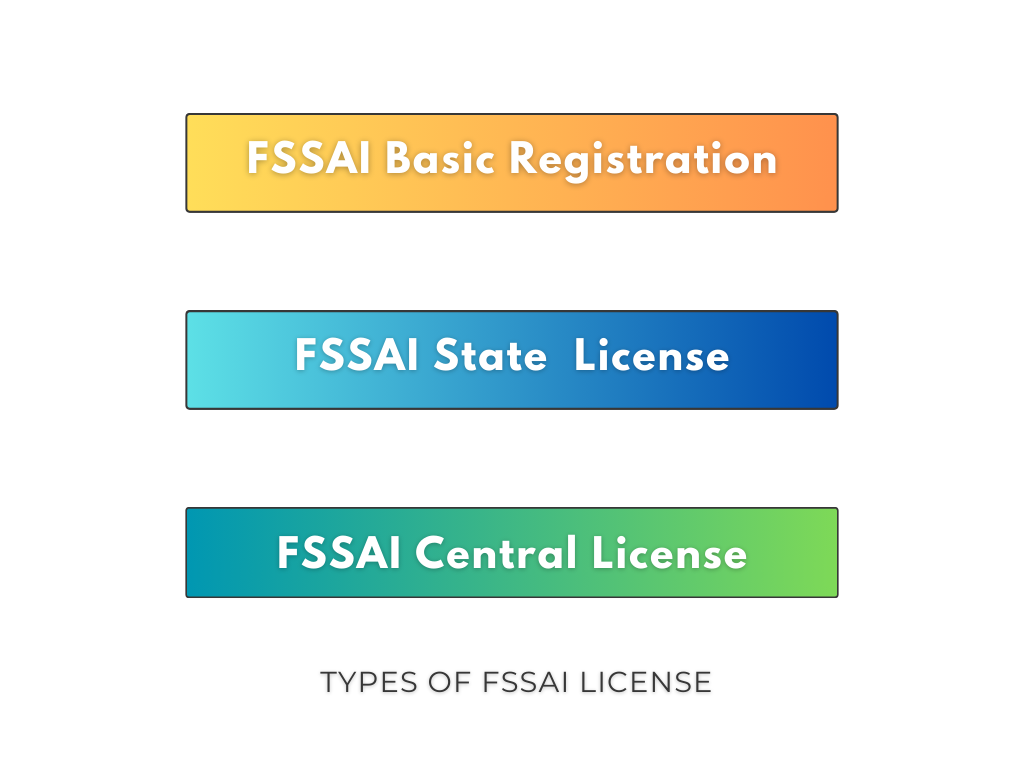
FSSAI Basic Registration
FSSAI basic registration is for small or petty FBOs such as hawkers, itinerant vendors, temporary stall owners, etc. Therefore, If the annual turnover of an FBO is less than Rs. 12 lakhs, then they shall obtain FSSAI registration. Therefore, a registration certificate is issued to them instead of a license.
FSSAI State License
FSSAI State License is for medium-sized FBOs. Therefore, if the annual turnover of an FBO is more than Rs. 12 lakhs but less than Rs. 20 crores, then such FBO shall obtain a state license.
However, the following two FBOs can obtain a state license if their annual turnover is upto Rs. 30 crores –
1) A Wholesaler
2) A Transporter having a maximum of 100 vehicles
FSSAI Central License
FSSAI Central License is for large-sized FBOs. Therefore, if the annual turnover of an FBO is more than Rs. 20 crores, then such FBO shall obtain a central license.
However, a wholesaler of food products and a transporter (having more than 100 vehicles) require a central license only if their annual turnover is more than Rs. 30 crores.
Eligibility for FSSAI License/ Registration
Apart from the turnover criteria, there are additional criteria as well for different types of FSSAI licenses and registration. Following is the FSSAI food license category list.
FSSAI Basic Registration
The following FBOs are eligible for FSSAI basic registration:
| Kind of Business | Criteria |
| Annual turnover up to Rs. 12 lakhs |
| Dairy Units (including Milk Chilling Units) | Upto 500 ltrs of milk per day or 2.5 MT milk solids per annum |
| Slaughtering House | Upto 2 large animals or 10 small animals or 50 poultry birds |
| Other food manufacturing or processing units | Annual turnover up to Rs. 12 lakhs or Production capacity upto 100 kgs/ ltrs per day |
| Transporter | Having a single vehicle and annual turnover of up to Rs. 12 lakhs |
| Food Vending Agencies | Having maximum of 12 vending machines in one state or union territory |
Moreover, below mentioned FBOs are also eligible for FSSAI basic registration:
- Persons who manufacture and sell the food item by themselves only
- Small-scale/ Cottage industries
- Individuals who distribute food in social and religious gatherings but are not a caterer
FSSAI State License
The following FBOs are eligible for FSSAI state license:
| Kind of Business | Criteria |
| Dairy Units (including Milk Chilling Units) | 501 – 50000 liters of milk per day or 2.5 – 2500 MT milk solids per annum |
| Vegetable Oil Processing Units | Upto 2 MT per day |
| Slaughtering House | 3 – 50 large animals or 11 – 150 small animals or 51 – 1000 poultry birds |
| Meat Processing | Upto 500 kg meat per day or 150 MT meat per annum |
| Other food manufacturing or processing units Note: For grains, cereals, and pulses milling units, there is no limit on production capacity. They shall compulsorily obtain a state license. | Production capacity of 101 kgs/ ltrs – 2 MT per day |
| Substances added to Food | Production capacity upto 2 MT per day |
| Cold Storage/ Refrigerated Storage/ Refrigerated Cold Storage | Upto 10000 MT storage capacity |
| Storage (Atmospheric Controlled + Cold Controlled Atmosphere) | Upto 1000 MT storage capacity |
| Storage without atmospheric controlled or cold controlled atmosphere | Upto 50000 MT storage capacity |
| Transporter | Having up to 100 vehicles and an annual turnover up to Rs. 30 crores |
| Wholesaler | Annual turnover up to Rs. 30 crores |
| Distributor | Annual turnover up to Rs. 20 crores |
| Retailer | Annual turnover up to Rs. 20 crores |
| Hotel | One-star, two-star, three-star, or four-star hotel or hotel (without a star) which has the rating of the Ministry of Tourism |
| Restaurants, Club or Canteen | Annual turnover up to Rs. 20 crores |
| Caterer or Mid-day Meal Caterer | Annual turnover up to Rs. 20 crores |
| Food Vending Agencies | Upto 100 vending machines in one state or union territory |
| Dhaba, boarding houses serving food, banquet halls with food catering arrangements, home-based canteens, stall holders, stalls in religious gatherings or fairs, etc. | Annual turnover is more than Rs. 12 lakhs |
| Mid-day Meal Canteen | Annual turnover is more than Rs. 12 lakhs |
FSSAI Central License
The following FBOs are eligible for FSSAI central license:
| Kind of Business | Criteria |
| Dairy Units (including Milk Chilling Units) | More than 50000 liters of milk per day or more than 2500 MT of milk solids per annum |
| Vegetable Oil Processing Units | More than 2 MT per day |
| Slaughtering House | More than 50 large animals or more than 150 small animals or more than 1000 poultry birds |
| Meat Processing | More than 500 kg meat per day or more than150 MT meat per annum |
| Other food manufacturing or processing units | Production capacity of more than 2 MT per day |
| Substances added to Food | Production capacity of more than 2 MT per day |
| Cold Storage/ Refrigerated Storage/ Refrigerated Cold Storage | More than 10000 MT storage capacity |
| Storage (Atmospheric Controlled + Cold Controlled Atmosphere) | More than 1000 MT storage capacity |
| Storage without atmospheric controlled or cold controlled atmosphere | More than 50000 MT storage capacity |
| Transporter | Having more than 100 vehicles and a turnover of more than Rs. 30 crores per annum |
| Wholesaler | Annual turnover of more than Rs. 30 crores |
| Distributor | Annual turnover of more than Rs. 20 crores |
| Retailer | Annual turnover of more than Rs. 20 crores |
| Hotel | 5-star and above |
| Restaurants | Annual turnover of more than Rs. 20 crores |
| Caterer | Annual turnover of more than Rs. 20 crores |
| Food Vending Agencies | More than 100 vending machines and/or located in two or more states or union territories |
| Mid-day Meal Caterer | Annual turnover up to Rs. 20 crores |
| Mid-day Meal Canteen | Annual turnover is more than Rs. 12 lakhs |
| Proprietary Food | No limit on production capacity |
| Food & Health Supplements, Nutraceuticals, etc. | No limit on production capacity |
| Non-specified food | No limit on production capacity |
| Radiation processing of food | No limit on production capacity |
| Importers | Any type of food product without any restriction on capacity |
| Food Business Activities at Central Govt. Agencies | No limit on capacity or turnover |
| Departmental Canteens at Central Govt. Institutions | Annual turnover of more than Rs.12 lakhs |
| Food Business Activities at Airport/ Seaport | No limit on capacity or turnover |
| Exporter, 100% EOU – FBO (having a certificate from Ministry of Commerce), manufacturer exporter, merchant/ trader | No limit on capacity or turnover |
| E-commerce | No limit on capacity or turnover |
| Head Office/ Registered Office of FBO having operations in two or more states or union territories | No limit on capacity or turnover |
| Caterers/ Canteens/ Petty Retailers/ Hawkers/ Restaurants at the railway station | Annual turnover of more than Rs.12 lakhs |
Benefits of FSSAI License/ Registration
The following are the benefits of obtaining an FSSAI license/ or registration.
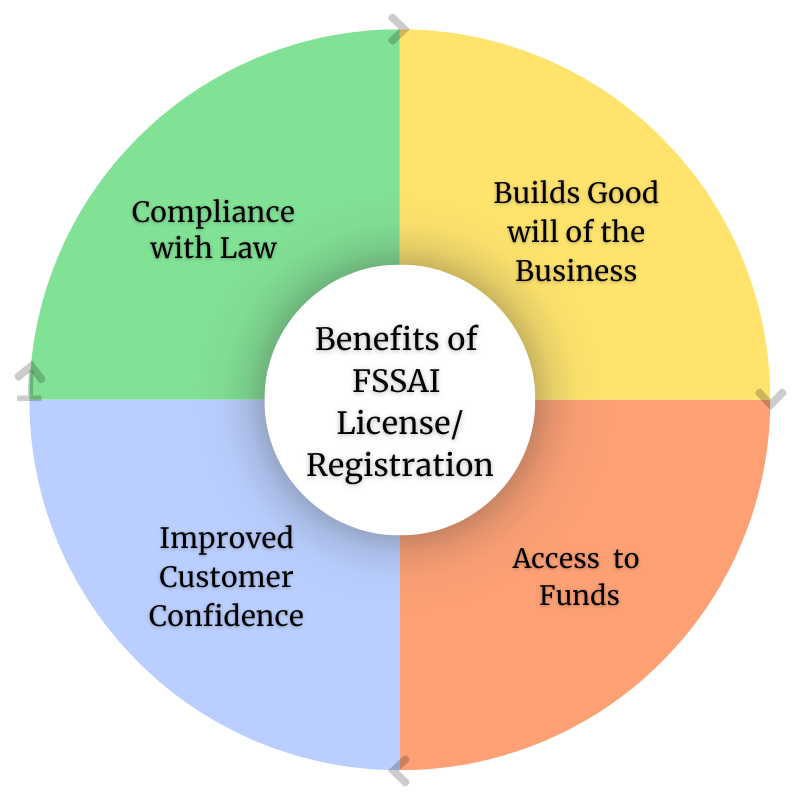
Compliance with Law
According to the Food Safety and Standards Act, of 2006, every food business shall obtain a license or registration to commence or carry on the food business. Therefore, obtaining an FSSAI license or registration helps an FBO in complying with the law and avoiding penalties for non-compliance.
Builds Goodwill in the Business
If an FBO has obtained an FSSAI license or registration, it indicates that he is supplying safe and quality food products or services. This improves the reputation of the business in the market and therefore, builds its goodwill as well.
Access to Funds
FSSAI license or registration also helps in enhancing the reputation of the business in the eyes of investors. Therefore, it becomes easy for FBOs to approach investors for funds.
Improved Customer Confidence
We all know that nowadays customers pay high attention to food safety and quality. Therefore, if a food business has an FSSAI license or registration, it gives an assurity to customers and improves their confidence in the business.
Get in touch with our experts and apply for an FSSAI food license today!
Conclusion
In conclusion, obtaining an FSSAI food license is not just a legal requirement but a strategic step toward ensuring food safety and quality. The diverse range of license types caters to businesses of all sizes, promoting a healthier and safer food ecosystem. Beyond compliance, the benefits extend to consumer trust, easier access to funds, etc.
